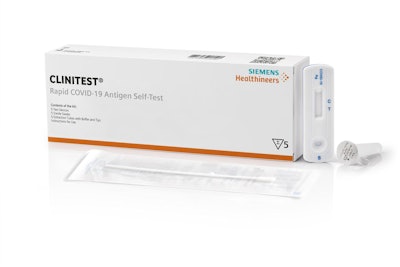When the COVID-19 Omicron variant broke out in January 2022, testing needs skyrocketed in a matter of weeks. Germany-based medical technology company Siemens Healthineers stepped up to make tens of millions of rapid antigen self-tests available to the U.S. population through state, federal, and local partnership efforts.
Read: Biotech Co. Outfits Nine COVID-19 Test Kit Lines with New Labelers
But the company faced challenges with warehousing and staging space in North America, as well as labor resources. To accommodate the sudden expansion in warehouse and logistics needs for massive volumes of product, Siemens Healthineers collaborated with R.R. Donnelley & Sons Company (RRD), global provider of marketing, packaging, print, and supply chain solutions. The companies had worked together for a number of years prior to the pandemic, and also worked on Instructions for Use (IFUs) in Europe related to COVID-19 in 2020. When the FDA approved the CLINTEST Rapid COVID-19 Antigen Self-Test, Siemens Healthineers again tapped RRD for their inbound logistics, test kit labeling, and fulfillment in the U.S.
Joerg Berner, acting head of point of care diagnostics at Siemens Healthineers, says, “It was critical to find a supplemental supply chain and warehouse solution that could help us supply high-quality test kits that would provide accurate COVID-19 results to the U.S. population. RRD’s ability to flex and adapt to changing demand helped address some of these needs.”
From January 2022 to March 2022, RRD supported the configuration, packaging, kitting, and fulfillment of diagnostic devices, tests, and care kits. “There were thousands of test kits and hundreds of different lot numbers and expiration dates, and we had the expertise to maintain and track them all,” says John Marrow, president of RRD Supply Chain Solutions. “We were also responsible for shipping the product out to Siemens Healthineers' end customers and tracking exactly where each individual test went."
A portion of Siemens Healthineers products were being stored with RRD in Houston. Marrow notes, “The facility is ISO 13485 accredited and therefore, ideally positioned to store the tests, manage the required configuration, and ship them out to Siemens Healthineers end customers.”
RRD’s core ERP systems provide enhanced planning and procurement capabilities designed to enable effective materials management systems in a complex environment. “We leverage a fully integrated software suite which incorporates the management of inventory, product planning, product data management, procurement, logistics integration, and fulfillment,” says Marrow.
One key capability: RRD utilizes proprietary demand planning tools to assist with effective forecasting and inventory planning processes, allowing them to more intelligently position materials and inventory to ensure continuity of supply. “Our program management team uses this tool to effectively manage directed purchases, RRD-sourced items, or materials manufactured in-house,” says Marrow. “End-to-end traceability is implemented from components to finished goods. Records are managed and retained in compliance with applicable elements of 21 CFR 820.”
With nearly two decades of experience helping medical device clients optimize their supply chains, the combination of their physical footprint, advanced systems, ability to manage high program volumes, and automated routing and sorting capabilities allow RRD to deliver efficient fulfillment/distribution solutions. “We manage all outbound logistics with the flexibility to deliver expedited or standard shipping both to B2B and B2C,” Marrow adds.
The companies are working together on an ongoing basis—RRD is currently adding a label to existing test kits to inform consumers that the tests have been authorized for extended expiration dating.
Read: Cartoning and Coding Line Delivers COVID-19 Vaccine Vials


























